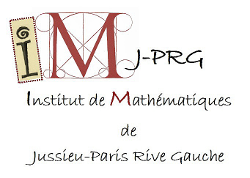

| Equipe(s) : | gr, |
| Responsables : | J. Alev, D. Hernandez, B. Keller, Th. Levasseur, et S. Morier-Genoud. |
| Email des responsables : | Jacques Alev <jacques.alev@univ-reims.fr>, David Hernandez <david.hernandez@imj-prg.fr>, Bernhard Keller <bernhard.keller@imj-prg.fr>, Thierry Levasseur <Thierry.Levasseur@univ-brest.fr>, Sophie Morier-Genoud <sophie.morier-genoud@imj-prg.fr> |
| Salle : | Info sur https://researchseminars.org/seminar/paris-algebra-seminar |
| Adresse : | |
| Description | Le séminaire est prévu en présence à l'IHP et à distance. Pour les liens et mots de passe, merci de contacter l'un des organisateurs ou de souscrire à la liste de diffusion https://listes.math.cnrs.fr/wws/info/paris-algebra-seminar. L'information nécessaire sera envoyée par courrier électronique peu avant chaque exposé. Les notes et transparents sont disponibles ici.
Since March 23, 2020, the seminar has been taking place remotely. For the links and passwords, please contact one of the organizers or subscribe to the mailing list at https://listes.math.cnrs.fr/wws/info/paris-algebra-seminar. The connexion information will be emailed shortly before each talk. Slides and notes are available here.
|